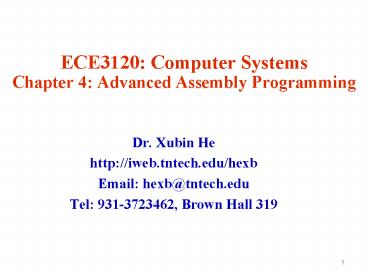ECE3120: Computer Systems Chapter 4: Advanced Assembly Programming - PowerPoint PPT Presentation
1 / 10
Title:
ECE3120: Computer Systems Chapter 4: Advanced Assembly Programming
Description:
Assemblers directives db, dc.b, fdb are used to define arrays of 8-bit elements. ... max rmb 1 ; maximum index value for comparison. min rmb 1 ; minimum index ... – PowerPoint PPT presentation
Number of Views:34
Avg rating:3.0/5.0
Title: ECE3120: Computer Systems Chapter 4: Advanced Assembly Programming
1
ECE3120 Computer SystemsChapter 4 Advanced
Assembly Programming
- Dr. Xubin He
- http//iweb.tntech.edu/hexb
- Email hexb_at_tntech.edu
- Tel 931-3723462, Brown Hall 319
2
Introduction - Program data structures
algorithm Data structures how information is
organized to be processed efficiently Algorithm
systematic method to process information
adding/deleting elements, traversing/searching a
data structure, sorting a data structure - Data
structures to be discussed 1. stacks a
last-in-first-out (LIFO) data structure 2. arrays
a set of elements of the same type 3. strings
a sequence of characters terminated by a special
character - Algorithms can be represented in
procedural steps or flowcharts
3
Stack
Push add a new item to the top Pop or Pull
remove an item from the top Stack
overflow Stack underflow
4
68HCS12 Support for the Stack Data Structure - A
16-bit stack pointer (SP) - Instructions and
addressing mode
5
- Indexable Data Structures (arrays)
- - Vectors and matrices are indexable data
structures. - - The first element of a vector is associated
with the index 0 in order to facilitate - the address calculation.
- - Assemblers directives db, dc.b, fdb are used to
define arrays of 8-bit elements. - - Assemblers directives dw, dc.w, and fdb are
used to define arrays of 16-bit - elements.
- - directives ds,rmb, ds.b are used to reserve
memory space for arrays with 8-bit element - - directives ds.w and rmw are used to reserve
memory space for arrays with 16-bit element - Example 4.2 Write a program to find out if the
array vec_x contains a value key. The array has
16-bit elements and is not sorted. - Solution
- - Use the double accumulator to hold the key
- - Use the index register X as a pointer to the
array - Use the index register Y to hold the loop count
- Need to compare key with every array element
because it is not sorted.
6
(No Transcript)
7
Binary Search Step 1 Initialize variables max and
min to n -1 and 0, respectively. Step 2 If max lt
min, then stop. No element matches the key. Step
3 Let mean (max min)/2 Step 4 If key
arrmean, then key is found in the array,
exit. Step 5 If key lt arrmean, then set max to
mean - 1 and go to step 2. Step 6 If key gt
arrmean, then set min to mean 1 and go to
step 2.
8
Example 4.3 Write a program to implement the
binary search algorithm and also a sequence of
instructions to test it. Solution n equ 30
array count key equ 69 key to be
searched org 1000 max rmb 1 maximum index
value for comparison min rmb 1 minimum index
value for comparison mean rmb 1 the average of
max and min result rmb 1 search
result org 1500 clra staa min initialize
min to 0 staa result initialize result to
0 ldaa n-1 staa max initialize max to
n-1 ldx arr use X as the pointer to the
array loop ldab min cmpb max lbhi notfound addb
max compute mean lsrb
9
stab mean save mean ldaa b,x get a copy
of the element arrmean cmpa key beq found bh
i search_lo ldaa mean inca staa min place
mean1 in min to continue bra loop search_lo ldaa
mean deca staa max bra loop found ldaa 1 st
aa result notfound swi arr db 1,3,6,9,11,20,30,45,
48,60 db 61,63,64,65,67,69,72,74,76,79 db 80,83,
85,88,90,110,113,114,120,123 end
10
Next
- Strings

